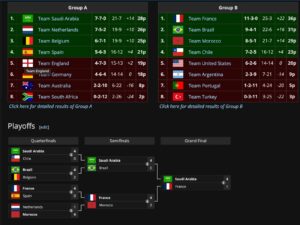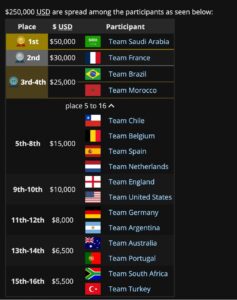The FIFAe World Cup in Riyadh, Saudi Arabia, showcased incredible talent, with Morocco emerging as a standout representative for Africa. Alongside South Africa, Morocco competed against some of the world’s best Rocket League teams, highlighting the region’s growing presence in the esports scene.
Morocco Shines in Group Stage and Beyond
Morocco had an impressive run in the group stage, securing 8 wins, 5 draws, and only 1 loss in Group B. This strong performance earned them a spot in the knockout rounds, demonstrating their readiness to compete on the global stage.
In contrast, South Africa struggled in Group A, finishing last with 2 draws and 12 losses, missing out on advancement. Despite the setback, their participation marks a step forward for African representation in international Rocket League tournaments.

Knockout Stages: Morocco’s Path to Glory
Morocco’s quarterfinals performance was a masterclass in teamwork and skill, as they defeated the Netherlands 4-1 to secure a spot in the semifinals. However, their journey to the top was halted by a narrow 4-3 loss to France, pushing them into the battle for third place.
In the end, Morocco’s stellar performance ensured a podium finish, marking a historic achievement for African Rocket League esports.
Saudi Arabia Crowned Champions
As the hosts, Saudi Arabia lived up to expectations, claiming the championship title. Their dominance throughout the tournament cemented their status as one of the world’s elite Rocket League teams.

Prize Pool Distribution
Morocco’s third-place finish earned them a share of the $25,000 prize pool allocated for third and fourth places. Meanwhile, South Africa will be taking home $5,500, awarded to the teams finishing 15th and 16th.

Africa’s Rising Esports Presence
This tournament highlights the growing potential of African teams on the global esports stage. Morocco’s success serves as a beacon of hope for aspiring players across the continent, while South Africa’s participation underscores the importance of continued investment in infrastructure and talent development.
As African teams continue to gain experience and exposure, the region’s impact on esports is only set to grow.
